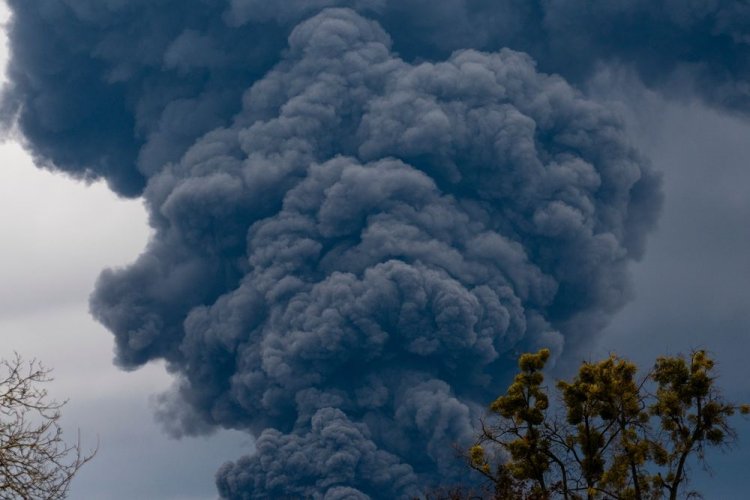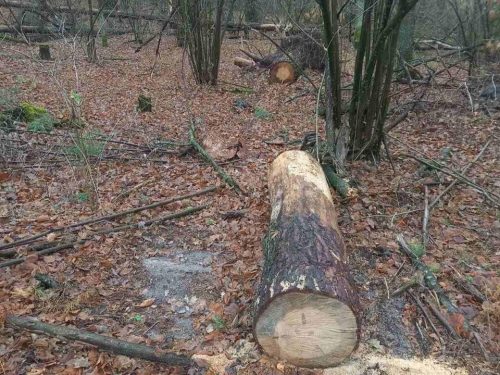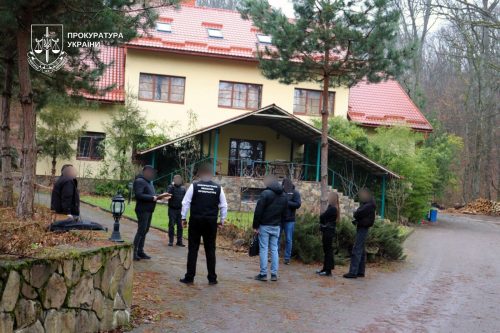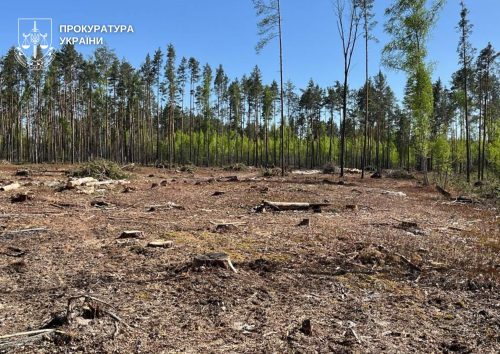Monitoring by the United Nations Environment Program (UNEP) and partner organizations indicates the significant negative impact of war on the environment, which may be felt by many future generations.
The government of Ukraine continues to record numerous crimes of the Russian occupiers against the environment and will seek compensation for the damages caused in international courts, reports Ministry of Environment.
It was noted in the material that work is already underway on the implementation of the Plan for the post-war recovery and development of Ukraine, the environmental component which was presented on July 4 by the head of the Ministry of Environment, Ruslan Strilets, at the Conference on the Recovery of Ukraine in Lugano.
The strategic goal of post-war reconstruction is a clean and safe environment, further movement along the European green course and reconstruction of the economy according to the principles of sustainable development. Therefore, Ukraine needs to implement 9 urgent reforms: in the field of waste management, state environmental control, regulation of industrial pollution, comprehensive environmental monitoring, management of nature conservation areas, etc.
Threats to nuclear and radiation safety
The situation in occupied by russian troops Zaporizhzhia NPP continues to pose a threat to all of Europe.
"The russian occupying forces are repressing the Ukrainian workers of the captured ZNPP. On July 3, it became known that Andriy Honcharuk, a diver of the Zaporizhzhya NPP hydraulic workshop, died as a result of russian torture. The occupiers turned the operating nuclear power plant into their military base," the article says.
According to the acting Chief State Inspector for Nuclear and Radiation Safety of Ukraine Oleg Korikov, a situation with a shortage of spare parts may arise at the Zaporizhzhia NPP. Currently, Ukraine cannot deliver to the station new valves and consumables that are used during the operation of the station.
On July 1, Energoatom, through its own efforts, restored the lost connection between the ZNPP and the International Atomic Energy Agency. Previously, the IAEA lost remote communication with its Surveillance System due to the disconnection of all Ukrainian mobile phone operators by the occupiers in Energodar. Currently, all mandatory monitoring data are being transmitted, and the IAEA has confirmed their receipt.
Attacks on infrastructure and industrial facilities
June 30
- russian shelling destroyed the warehouse of an agricultural enterprise with 40 tons of grain in Zelenodolsk, Dnipropetrovsk region;
- struck a woodworking enterprise in the Osnovyansk district of Kharkiv, severely damaging one of the production buildings.
1st of July
- 12 rockets were fired at port infrastructure facilities and private enterprises, in particular, at the production of perfumes and lime in Mykolaiv;
- shelled Chasiv Yar in Donetsk region, because of which the refractories plant was engaged. Firefighters managed to extinguish the fire quickly.
On July 2, a fire broke out at one of the largest electrical substations in Ukraine, Donbaska 750, on the outskirts of the Bakhmut community of the Donetsk region, after the occupiers attacked it.
July 3
- as a result of the shelling of the russian "Grady", a fire broke out at the Avdiiv coke-chemical plant, the largest in Europe, in the Donetsk region
- russian troops struck the territory of the Vuglegirsk thermal power plant in the Donetsk region, as a result of which tanks with fuel oil caught fire. A large-scale fire lasted more than a day;
- an artillery strike destroyed a gas station in Orichov, Zaporizhzhia region.
July 5
- the massive shelling of Sloviansk in Donetsk region caused a fire in the market with an area of 1,200 square meters;
- As a result of a russian missile strike, a cheese factory in Bashtanka, Mykolaiv region, suffered significant damage.
On July 6, as a result of russian shelling, a fire broke out at a gas station in Chuguyev, Kharkiv region.
During the fighting in the Severodonetsk and Lysychansk regions, significant damage was caused to the Severodonetsk thermal power plant, the Donsoda plant, and the Lysychansk Oil Refinery. The Azot plant, one of Europe's largest producers of ammonia and mineral fertilizers, was destroyed by 70%.
"Large-scale fires at infrastructure and industrial facilities lead to air poisoning with particularly dangerous substances. Polluting substances can be carried by winds over long distances," explained the Ministry of Environment.
SEI specialists calculated 508 million hryvnias of damage to the environment caused by Russian attacks on an oil depot in the town of Kalynivka, Fastivsky District, Kyiv Region in March. Due to shelling, the fire at the oil depot lasted for 5 days.
The SEI also calculated 221 million hryvnias in damages to the environment as a result of the missile attack on the Darnytskyi Car Repair Plant in Kyiv. The total area of blockage as a result of the destruction is 4 thousand square meters. m.
According to the Ministry of Energy, 90% of wind power plants in Ukraine have been destroyed or occupied. In addition, 30% of solar plants and 30.1% of cogeneration plants were destroyed or seized.
Pollution directly caused by hostilities
According to the State Emergency Service, from February 24 to July 6, 2022, 154,045 explosive objects, including 2,024 aerial bombs, were defused on the territory of Ukraine. The territory with an area of 63 thousand 644 hectares was surveyed.
Destroyed military equipment and ammunition, as well as exploding missiles and aerial bombs, contaminate the soil and groundwater with chemicals, including heavy metals.
Pity the nature reserves and protected ecosystems
NASA remote sensing data as of July 3 showed an abnormally high number of fires along the front line in the Mykolaiv and Kherson regions. Russian troops launched large-scale artillery strikes. Munitions explosions and the summer heat were catalysts for large fires in fields and forests.
Thus, on July 2, as a result of russian shelling in the forest tract of the Halytsynivska community of the Mykolaiv region, forest plantations on an area of 1 ha caught fire, which were extinguished by firefighters.
At least 20 species of endemic rare plants in Ukraine are threatened with destruction due to the war.
Military actions lead to the powerful action of several factors that have a detrimental effect on vegetation, fungi and lichens:
- the destructive effect of explosions, the passage of military equipment and the construction of fortifications;
- fires caused by the action of ammunition, which are difficult to extinguish in the conditions of military operations;
- chemical pollution and soil pollution with sulfur, which destroys the seeds and roots of grasses with the formed sulfuric acid when in contact with water.
"Military actions directly destroy vegetation and indirectly destroy natural habitats. Such changes can be fatal for endemic and rare species," the article emphasized.
Damage to water resources
Russian troops are carrying out targeted strikes on the infrastructure for the intake, purification and supply of water, as well as sewage treatment facilities.
So July 5 russian troops launched a missile attack on the Khmelnytskyi region. The target of the strikes was a water tower that fully supplies the local community with water. Due to russian aggression, water supply and drainage facilities in Luhansk, Donetsk, Zaporizhzhia, Kharkiv and Mykolaiv regions were significantly damaged.
In occupied Mariupol, up to 3% of the city's residents have access to water. People are forced to travel kilometers to stand in queues at water collection points.
SEI notes that the russians are stealing water from the North Crimean Canal on a large scale. According to a preliminary assessment, more than 4 million cubic meters of water are being stolen from the canal, which causes 32.6 million UAH of damage per day. Thus, during the 132 days of the full-scale war, the russian federation already owed more than 4 billion hryvnias.
Black and Azov seas
Russian forces attack infrastructure along the coasts of the Black and Azov seas and ships at anchorages, leading to water pollution and the spread of toxins into the sea.
1st of July the russians launched missile attacks on tourist infrastructure facilities in the Odesa region. On the evening of July 1, 2022, the russian aviation bombarded Zmiiny Island with phosphorus bombs, at least one bomb fell directly into the Black Sea.
Russian troops have placed a large number of mines in the waters of the Black Sea, which threaten shipping, people and marine animals.
July 2 on one of the beaches in Odesa, a man was blown up by an explosive device while swimming and died. On July 3, a sea mine was carried by the current from the Black Sea to the Dniester estuary. The mine was discovered in time. It was located in a coastal area with difficult access, but specialists of the Navy demolition team ensured its neutralization. According to the Odesa regional administration of the State Emergency Service, due to the large number of explosive objects in the water area, the beaches in Odesa will not be opened.
Earlier EcoPolitic reported, that USAID will help Ukraine in green restoration and implementation of reforms.
As EcoPolitic previously informed, eco-activists criticized the recovery plan of Ukraine, which was presented at the Conference on the Reconstruction of Ukraine in Lugano, Switzerland, and was called the "Lugan shame".





